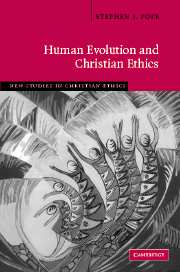Book contents
- Frontmatter
- Contents
- General editor's preface
- Acknowledgments
- Introduction
- Chapter 1 Evolution and religion
- Chapter 2 The indifference of Christian ethics to human evolution
- Chapter 3 Varieties of reductionism
- Chapter 4 Faith, creation, and evolution
- Chapter 5 Chance and purpose in evolution
- Chapter 6 Human nature and human flourishing
- Chapter 7 Freedom and responsibility
- Chapter 8 Human dignity and common descent
- Chapter 9 Christian love and evolutionary altruism
- Chapter 10 The natural roots of morality
- Chapter 11 Natural law in an evolutionary context
- Chapter 12 Sex, marriage, and family
- Bibliography
- Index of scriptural citations
- Index of names and subjects
Chapter 11 - Natural law in an evolutionary context
Published online by Cambridge University Press: 26 June 2009
- Frontmatter
- Contents
- General editor's preface
- Acknowledgments
- Introduction
- Chapter 1 Evolution and religion
- Chapter 2 The indifference of Christian ethics to human evolution
- Chapter 3 Varieties of reductionism
- Chapter 4 Faith, creation, and evolution
- Chapter 5 Chance and purpose in evolution
- Chapter 6 Human nature and human flourishing
- Chapter 7 Freedom and responsibility
- Chapter 8 Human dignity and common descent
- Chapter 9 Christian love and evolutionary altruism
- Chapter 10 The natural roots of morality
- Chapter 11 Natural law in an evolutionary context
- Chapter 12 Sex, marriage, and family
- Bibliography
- Index of scriptural citations
- Index of names and subjects
Summary
Chapter two criticized several major moral theologians from the natural-law tradition for ignoring human evolution. I now turn to four prominent moralists from that same tradition who do take seriously our evolutionary origins, namely Alasdair MacIntyre, Larry Arnhart, Jean Porter, and Lisa Sowle Cahill. After this analysis I argue that knowledge of evolution confirms some aspects of Thomistic natural law and calls for a revision of others.
NATURAL LAW AND HUMAN EVOLUTION: RECENT EFFORTS
Knowledge of human evolution calls for a change in the way we think about biological nature in general and human nature in particular. It brings a heightened awareness of the presence of tension and conflict among particular goods and virtues, and the consequent need for concrete moral decisions that involve trade-offs, denial, and sacrifice of some goods for the sake of others. Human evolution has left us with a heterogeneous, mixed, and conflicted set of human inclinations and the goods toward which they move. Human nature is in some ways at odds with itself, divided by conflicting inclinations that are brought into working order, and not complete harmony, only through intentional effort and discipline.
I have argued in this book that knowledge of human evolution can complement the moral and anthropological commitments found in the Thomistic approach to natural law. This tradition emphasizes our natural inclination to various kinds of goods, from survival and sustenance to sociality and friendship. These inclinations are based in our evolved species-wide emotional and cognitive constitution.
- Type
- Chapter
- Information
- Human Evolution and Christian Ethics , pp. 268 - 296Publisher: Cambridge University PressPrint publication year: 2007



